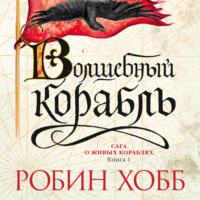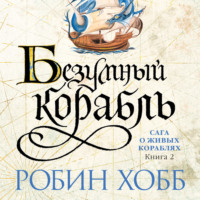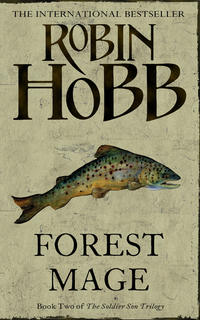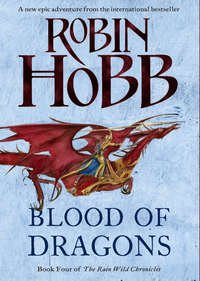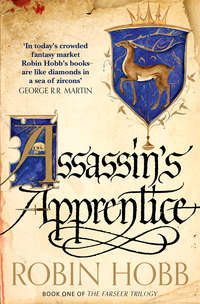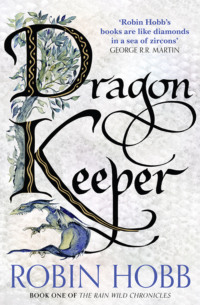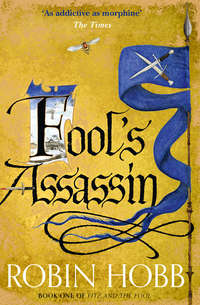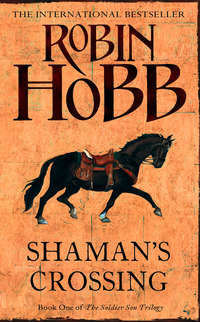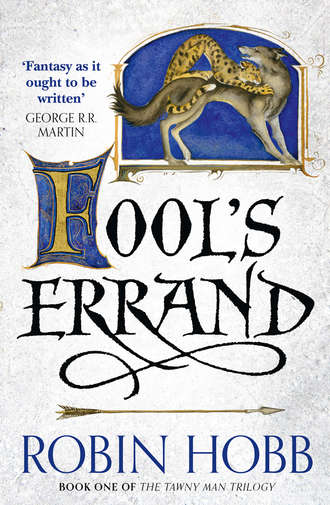
Полная версия
Fool’s Errand
With the ease of the naturally gregarious, she took over half the dinner chores. I had not shared kitchen tasks with a woman since my year among the Witted folk, and even then, Holly had been a near-silent companion at such times. Jinna talked on, clattering pots and pans and filling my small home with her bustle and friendly gossip. She had the rare knack of coming into my territory and handling my possessions without me feeling displaced or uneasy. My feelings bled over to Nighteyes. He soon ventured into the cabin, and assumed his customary attentive post by the table. She was unruffled by his intent stare, and accepted his adeptness at catching the fish trimmings she tossed his way. The fish was soon simmering in a pot with her herbs. I raided my garden for young carrots and fresh greens while she fried thick slabs of bread in lard.
It seemed that dinner appeared on the table with no real effort from anyone. Nor had she neglected to prepare bread for the wolf as well, though I think Nighteyes ate it more out of sociability than hunger. The poached fish was moist and savoury, spiced as much with her conversation as the herbs. She did not chatter endlessly, but her stories encouraged responses, and she listened with as much appreciation as she gave to the food. The dishes were cleared from the table with as little effort. When I brought out the Sandsedge brandy, she exclaimed delightedly, ‘Now, this is the perfect end to a good meal.’
She took her brandy to the hearth. Our cooking fire had burned low. She added another piece of wood, more for light than warmth, and settled herself on the floor beside the wolf. Nighteyes didn’t even twitch an ear. She sipped her brandy, gave an appreciative sigh, then gestured with her cup. My scroll-cluttered desk was just visible through the open door of my study. ‘I knew you made inks and dyes, but from what I see, you employ them as well. Are you a scribe of some kind?’
I gave a desultory shrug. ‘Of sorts,’ I admitted. ‘I do not attempt the fancy work, though I do simple illustration. My lettering is no better than passable. For me, there is a satisfaction in taking knowledge and committing it to paper, where it is accessible to all.’
‘To any who can read,’ Jinna amended my words.
‘That is true,’ I conceded.
She cocked her head at me and smiled. ‘I don’t think I approve.’
I was startled, not just that she disagreed with such a thing, but that she could do it so pleasantly. ‘Why not?’
‘Perhaps knowledge should not be available to all. Perhaps it should be earned, parcelled out from master to worthy student only, rather than committed to paper where anyone who chances upon it may claim it for himself.’
‘I confess to some of the same doubts myself,’ I replied, thinking of the Skill-scrolls that Chade now studied. ‘And yet I have known of cases in which a master died an untimely death, and all she knew went with her, before it could be passed on to her chosen pupil. Generations of knowledge were lost in one death.’
She was silent for a time. ‘Tragic,’ she admitted at last. ‘For though masters of a skill may share a great deal of knowledge, each has his own secrets, destined only for his own apprentices.’
‘Consider someone such as yourself,’ I went on, pushing my advantage in the discussion. ‘You practise a trade that is as much an art, woven of secrets and skills shared only by those others who practise hedge-magic. You have no apprentice at all that I have seen. Yet I would wager there are aspects of your magic that are yours alone, ones that would die with you if you perished tonight.’
She looked at me for a still moment, then took another sip of her brandy. ‘There’s a chill thought to dream on,’ she replied wryly. ‘Yet there is this also, Tom. I have no letters. I could not put my knowledge in such a form, unless someone such as yourself aided me. And then I would not be certain if you had truly put down what I know, or what you thought I had told you. That is half of teaching an apprentice: making sure the youngster learns what you said, not what she thinks you said.’
‘Very true,’ I had to agree. How often I had thought I understood Chade’s directions, only to come to disaster when I tried to mix the concoction on my own? Another little ripple of uneasiness went through me, as I thought of Chade trying to teach Prince Dutiful from the scrolls. Would he teach what some forgotten Skillmaster had committed to paper, or only his understanding of it? I pulled my thoughts back from the unsettling notion. I had no duty there. I had warned him; that was as much as I could do.
Conversation lagged after that, and Jinna soon sought rest in Hap’s bed. Nighteyes and I went out to shut up the chickenhouse for the night and make our evening round of our smallholding. All was well and calm in the peaceful summer night. I cast one longing look towards the cliffs. The waves would be lace-edged silver tonight. I forbade it to myself and felt Nighteyes’ relief at my decision. We added more green alder branches to the slow fire in the smokehouse. ‘Bedtime,’ I decided.
On nights such as this, we used to hunt together.
That we did. It would be a good night for hunting. The moon will make the game restless and easy to see.
Nevertheless, he followed me as I turned back towards the hut. Regardless of how well we both recalled it, neither of us were the young wolves we once had been. Our bellies were full, the hearth was warm, and rest might ease the dull ache in Nighteyes’ haunches. Dreams of hunting would have to suffice tonight.
I awoke to the morning sounds of Jinna ladling water into a kettle. When I came out into the kitchen, she had already set the kettle to boil over the stirred fire. She looked over her shoulder as she was slicing bread. ‘I hope you don’t feel that I’ve made myself too much at home,’ she offered.
‘Not at all,’ I replied, but it did feel a bit odd. By the time I had seen to my animals and returned with the day’s eggs, hot food was steaming on the table. When we had eaten, she helped with the tidying up.
She offered me thanks for the hospitality, and added, ‘Before I go, perhaps we might do a bit of trading. Would you consider a charm or two from my stock in exchange for some of your yellow and blue inks?’
I found that I was glad to delay her leaving, not only because her company was pleasant, but because I had always been intrigued by hedge-magic. Here was an opportunity, perhaps, for a closer look at the tools of her trade. We went first to my workbench in the shed, where I packaged up pots of yellow, blue, and a small quantity of red ink for her. As I sealed the pots with wooden stoppers and wax, she explained that using colours on some of her charms seemed to increase their efficacy, but that this was an area in which she was still making discoveries. I nodded to her words, but much as I longed to, I refrained from asking more details. It did not seem polite.
When we returned to the house, she set the pots of dye on the table, and opened her own pack. She spread a number of her bagged charms on the table. ‘What will you choose, Tom Badgerlock?’ she asked with a smile. ‘I have charms for verdant gardens, for hunter’s luck, for healthy babes – that’s small use to you, let me put that one back. Ah. Here’s one you might find useful.’
She whisked the cover off a charm. As she did so, Nighteyes let out a low growl. His hackles stood as he stalked to the door and nosed it open. I found myself backing away from the object she revealed. Short rods of wood marked with shrieking black symbols were fastened to each other at chaotic angles. Ominous beads were dangerously interspersed with them. A few tortured tufts of fur, twisted and fixed with pitch clung to it. The object both offended and distressed me. I would have fled if I had dared take my eyes off it. I abruptly felt the wall of the cabin against my back. I pressed against it, knowing that there was a better path to escape, but unable to think what it was.
‘I beg your pardon.’ Jinna’s gentle words came from a vast distance. I blinked, and the object was gone, mantled in cloth and hidden from my sight. Outside the door, Nighteyes’ low growl rose to a whistling whine and ceased. I felt as if I had surfaced from deep waters. ‘It had not occurred to me,’ Jinna apologized as she thrust the charm deep into her pack. ‘It’s intended to keep predators away from chickenhouses and sheep-pens,’ she explained.
I got my breath back. Her gaze did not meet mine. Apprehension hung like a miasma between us. I was Witted, and now she knew it. How would she employ that knowledge? Would she merely be disgusted? Frightened? Scared enough to bring destruction down on me? I imagined Hap returning to a burned-out cabin.
Jinna suddenly looked up and met my eyes as if she had overheard my thoughts. ‘A man is as he is made. A man can’t help how he’s made.’
‘That’s so,’ I muttered in response, shamed at how relieved I felt. I managed to step away from the wall and towards the table. She didn’t look at me. She rooted through her pack as if the incident had never occurred.
‘So, then, let’s just find you something a bit more appropriate.’ She sorted through her bagged charms, stopping sometimes to pinch at the contents to freshen her memory of what was inside. She chose one in a green pouch and placed it on the table. ‘Will you take one to hang near your garden, to encourage your green things to prosper?’
I nodded mutely, still recovering from my fear. Moments ago, I would have doubted the power of her charms. Now I almost feared their potency. I clenched my teeth as she unveiled the garden charm, but as I stared at it, I felt nothing. When I met her eyes, I found sympathy there. Her gentle smile was reassuring.
‘You’ll have to give me your hand so I can tune it to you. Then we’ll take it outside and adjust it for your garden. Half this charm is for the garden, and half for the gardener. It’s that which is between the gardener and his bit of soil that makes a garden. Give me your hands.’
She seated herself at my table and held her own hands out to me, palms up. I took the chair opposite hers and, after an awkward hesitation, placed my palms on top of hers.
‘Not that way. A man’s life and ways are told in the palms of his hands, not the backs.’
Obediently, I turned my hands over. In my apprentice days, Chade had taught me to read hands, not to tell fortunes, but to tell a man’s past. The calluses of a sword differed from those of a scribe’s pen or a farmer’s hoe. She bent close over my hands, staring at them intently. As she scanned my palms, I wondered if her eyes would discover the axe I had once borne, or the oar I had wielded. Instead, she studied my right hand intently, frowned, then transferred her gaze to my left. When she looked up at me, her face was a picture. The smile that twisted her face was a rueful one.
‘You’re an odd one, Tom and no mistake! Were they not both at the ends of your arms, I’d say these were the hands of two different men. It’s said that your left hand tells what you were born with, and your right hand what you have made of yourself, but even so, such differences in a man’s two hands I’ve seldom seen! Look what I see in this hand. A tender-hearted boy. A sensitive young man. And then … Your lifeline stops short on your left hand.’ As she spoke, she let go of my right hand. She set her forefinger to my left palm, and her nail traced a tickling line to where my life ended. ‘Were you Hap’s age, I’d be fearing I was looking at a young man soon to die. But as you’re sitting there across from me, and your right hand bears a nice long lifeline, we’ll go by it, shall we?’ She released my left hand, and took my right in both of hers.
‘I suppose so,’ I conceded uncomfortably. It was not only her words that made me ill at ease. The simple warm pressure of her hands gripping mine had made me suddenly aware of Jinna as a woman. I was experiencing a very adolescent response to it. I shifted in my chair. The knowing smile that flickered over her face discomfited me even more.
‘So. An avid gardener, I see, one devoted to the knowing of many herbs and their uses.’
I made a neutral noise. She had seen my garden, and could be speculating based on what grew there. She studied my right hand a bit more, sweeping her thumb across it to smooth the lesser lines away, and then cupping my fingers in her own and encouraging my hand to close slightly to deepen the folds. ‘Left or right, it’s not an easy hand to read, Tom.’ She frowned to herself, and compared the two again. ‘By your left hand, I’d say you’d had a sweet and true love in your short life. A love that ended only in your death. Yet here in your right hand, I see a love that wends its way in and out of all your many years. That faithful heart has been absent for a time, but is soon to return to you again.’ She lifted her clear hazel eyes to mine to see if she had scored true. I shrugged one shoulder. Had Hap been telling her tales of Starling? Scarcely what I would call a faithful heart. When I said nothing, she returned her attention to my hands, her gaze going from one to the other. She frowned slightly, raising a furrow between her brows. ‘Look here. See this? Anger and fear, shackled together in a dark chain … it follows your lifeline, a black shadow over it.’
I pushed aside the uneasiness her words roused in me. I leaned forwards to look into my own hand. ‘It’s probably just dirt,’ I offered.
She gave a small snort of amusement and shook her head again. But she did not return to her ominous peering. Instead she covered my hand with her own and met my eyes. ‘Never have I seen two palms so unlike on the same man. I suspect that sometimes you wonder if you even know who you are yourself.’
‘I’m sure every man wonders that from time to time.’ It was oddly difficult to meet her near-sighted gaze.
‘Hm. But you, perhaps, have more honest reason to wonder it than others. Well,’ she sighed. ‘Let me see what I can do.’
She released my hands, and I drew them back. I rubbed them together under the table as if to erase the tickling of her touch. She took up her charm, turned it several times, and then unfastened a string. She changed the order of the beads on the string, and added an extra brown bead from her pack. She re-tied the string, and then took out the pot of yellow ink I had traded her. Dipping a fine brush in it, she outlined several black runes on one of the dowels, bending close over it to peer at her work. She spoke as she worked. ‘When next I come to visit, I expect you to tell me this has been your best year ever for plants that bear their fruits above ground where the sun ripens them.’ She blew on the charm to dry the ink, then put away both pot and brush. ‘Come, now, we have to adjust this to the garden.’
Outside, she sent me to find and cut a forked branch at least as tall as myself. When I returned with it, I found she had dug a hole at the southeast corner of my garden plot. I set the pole in it as she directed, and filled in the hole. She hung the charm from the right fork of the branch. When the wind stirred it, the beads rattled gently and a small bell chimed. She tapped the bell with a fingertip. ‘It discourages some birds.’
‘Thank you.’
‘You’re welcome. This is a good spot for one of my charms. It pleases me to leave it here. And when next I come, I shall be interested to see how well it has worked for you.’
It was the second time she had mentioned visiting again. The ghost of my court manners nudged me. ‘And when next you come, you shall find yourself as welcome as you were this time. I shall look forward to your visit.’
The smile she gave me dimpled her cheeks more deeply. ‘Thank you, Tom. I shall certainly stop here again.’ She cocked her head at me and spoke with sudden frankness. ‘I know you are a lonely man, Tom. That won’t always be so. I could tell that, at first, you doubted the power of my charms. You still doubt the truth of what I can see in the palm of a man’s hand. I don’t. Your one true love is stitched in and out and through your life. Love will return to you. Don’t doubt that.’
Her hazel eyes met mine so earnestly that I could neither laugh nor frown at her. So I nodded mutely. As she shouldered her pack and strode off down the lane, I watched her go. Her words tugged at me, and hopes long denied struggled to grow. I thrust them away from me. Molly and Burrich belonged to one another now. There was no place for me in their lives.
I squared my shoulders. I had chores to do, wood to stack, fish to put by, and a roof to mend. It was another fine summer day. Best use it while I had it, for while summer smiles, winter is never far away.
FIVE
The Tawny Man
There is some indication, in the earliest accounts of the territories that eventually became the Six Duchies, that the Wit was not always a despised magic. These accounts are fragmentary, and the translations of these old scrolls are often disputed, but most of the master scribes will agree that at one time there were settlements where the preponderance of folk were born with the Wit and actively practised its magic. Some of these scrolls would indicate that these folk were the original inhabitants of the lands. This may be the source of the name that the Witted people apply to themselves: Old Blood.
In those times, the lands were not so settled. Folk relied more on hunting and the collecting of wild bounty than on harvesting what they had themselves planted. Perhaps in those days a bond between a man and a beast did not seem so uncanny, for folk provided for themselves much as the wild creatures did.
Even in more recent histories, accounts of Witted folk being slain for their magic are rare. Indeed, that these executions are recorded at all would seem to indicate that they were unusual, and hence noteworthy. It is not until after the brief reign of King Charger, the so-called ‘Piebald Prince’ that we find the Wit referred to with loathing and an assumption that its practice merits death. Following his reign, there are accounts of widespread slaughter of Witted folk. In some cases, entire villages were put to death. After that time of carnage, either those of Old Blood were rare, or too wary to admit that they carried the Wit-magic.
Beautiful summer days followed, one after another, like blue and green beads on a string. There was nothing wrong with my life. I worked in my garden, I finished the repairs to my long-neglected cottage, and in the early mornings and the summer twilight, I hunted with the wolf. I filled my days with good and simple things. The weather held fine. I had the warmth of the sun on my shoulders as I laboured, the swiftness of wind against my cheeks when I walked the sea cliffs in the evening, and the richness of the loamy earth in my garden. Peace but waited for me to give myself up to it. The fault was in me that I held back from it.
Some days, I was almost content. The garden grew well, the pea pods swelling fat, the beans racing up their trellis. There was meat to eat as well as some to set by, and daily the cottage became more snug and tidy. I took pride in what I accomplished. Yet sometimes I would find myself standing by Jinna’s charm in the garden, idly spinning the beads on it as I gazed towards the lane. Waiting. It was not so bad to wait for Hap to return when I was not so aware of waiting. But waiting for the boy’s return became an allegory for my whole life. When he did come back, what then? It was a question I had to ask myself. If he had succeeded, he would return only to leave again. It was what I should hope for. If he had not succeeded in earning his prentice fee, then I would have to rack my wits for another way to gain the money. And all the while, I would be waiting still. Waiting for Hap to return would transform itself into waiting for Hap to leave. Then what? Then … something more, my heart suggested, then it would be time for something more, but I could not put my finger on what stirred this restlessness in my soul. At the moments when I became conscious of that suspension, all of life chafed against me. Then the wolf would heave himself to his feet with a sigh and come to lean against me. A thrust of his muzzle would put his broad-skulled head under my hand.
Stop longing. You poison today’s ease, reaching always for tomorrow. The boy will come back when he comes back. What is there to grieve over in that? There is nothing wrong with either of us. Tomorrow will come soon enough, one way or another.
I knew he was right, and I would, usually, shake it off and go back to my chores. Once, I admit, I walked down to my bench overlooking the sea. But all I did was sit down on it and stare out across the water. I did not attempt to Skill. Perhaps, after all the years, I was finally learning that there was no comfort for loneliness in such reaching.
The weather continued fine, each morning a cool, fresh gift. Evenings, I reflected as I took slabs of fish from their hooks inside the smoker, were more precious than gifts. They were rest earned and tasks completed. They were satisfaction, when I let them be. The fish were done to my liking, a hard shiny red on the outside, but enough moisture left trapped within to keep a good flavour. I dropped the last slab into a net bag. There were already four such bags hanging from the rafters in the cottage. This would finish what I knew we needed for the winter. The wolf followed me inside and watched me climb up on the table to hang the fish. I spoke over my shoulder to him. ‘Shall we get up early tomorrow and go looking for a wild pig?’
I didn’t lose any wild pigs. Did you?
I looked down at him in surprise. It was a refusal, couched as humour, but a refusal all the same. I had expected wild enthusiasm. In truth, I myself had little appetite for such a strenuous hunt as a pig would demand. I had offered it to the wolf in the hopes of pleasing him. I had sensed a certain listlessness in him of late, and suspected that he mourned Hap’s absence. The boy had been a lively hunting companion for him. I feared that in comparison, I was rather dull. I know he felt my query as I gazed at him, but he had retreated into his own mind, leaving only a distracted haze of thoughts.
‘Are you well?’ I asked him anxiously.
He turned his head sharply towards the door. Someone comes.
‘Hap?’ I jumped down to the floor.
A horse.
I had left the door ajar. He went to it and peered out, ears pricked. I joined him. A moment passed, and then I heard the steady thudding of hoofbeats. Starling?
Not the howling bitch. He did not disguise his relief that it was not the minstrel. That stung a bit. Only recently had I fully realized how much he had disliked her. I said nothing aloud, nor did I form the thought towards him, but he knew. He cast me an apologetic glance, then ghosted out of the house.
I stepped out onto the porch and waited, listening. A good horse. Even at this time of day, there was life in its step. As horse and rider came into view, I took breath at the sight of the animal. The quality of her breeding shouted from her every line. She was white. Her snowy mane and tail flowed as if she had been groomed but moments before. Silky black tassels bound in her mane complemented the black and silver of her harness. She was not a large mare, but there was fire in the way she turned a knowing eye and a wary ear towards the invisible wolf that flanked her through the woods. She was alert without being afraid. She began to lift her hooves a bit higher, as if to assure Nighteyes that she had plenty of energy either to fight or flee.
The rider was fully worthy of the horse. He sat her well, and I sensed a man in harmony with his mount. His garments were black, trimmed in silver, as were his boots. It sounds a sombre combination, did not the silver run riot as embroidery round his summer cloak, and silver-edged white lace at his cuffs and throat. Silver bound his fair hair back from his high brow. Fine black gloves coated his hands like a second skin. He was a slender youth, but just as the lightness of his horse prompted one to think of swiftness, so did his slimness call to mind agility rather than fragility. His skin was a sun-kissed gold, as was his hair, and his features were fine. The tawny man approached silently save for the rhythmic striking of his horse’s hooves. When he drew near, he reined in his beast with a touch, and sat looking down on me with amber eyes. He smiled.


